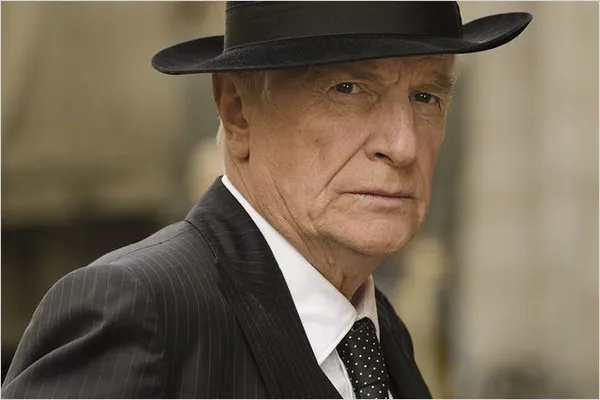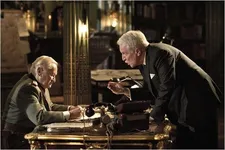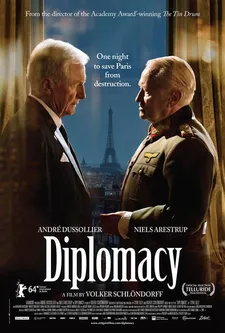 |
| André Dussollier as Swedish consul-general Raoul Nordling: "On the other hand, Nordling needs the General…" |
Volker Schlöndorff discusses more Diplomacy, the link to Josephine Baker and André Dussollier in Alain Resnais' On Connaît La Chanson, The Ninth Day, Billy Wilder's comedy of manners, whether or not he has an Emperor Waltz in his past and Ernst Lubitsch, Walter Reisch, Conrad Veidt and Alma Hitchcock's blackout training.
Based on Cyril Gély's play Diplomatie, which starred Niels Arestrup as German General Dietrich von Choltitz and André Dussollier as Swedish consul-general Raoul Nordling on stage in Paris, Schlöndorff, with the actors recreating their roles, shows us an intimate portrait of two men at odds, dueling with more than their lives at stake.
 |
| Niels Arestrup as General Dietrich von Choltitz and André Dussollier as consul-general Raoul Nordling, in Volker Schlöndorff's gripping Diplomacy (Diplomatie) |
Anne-Katrin Titze: In Diplomacy you have a scene with General von Choltitz on the balcony, being told to go in because of the blackout. The moment isn't funny, but it was so for me by association, because I knew I would be talking to you also about Wilder. He describes the blackout training in Bel Air during the Second World War, where Walter Reisch and Ernst Lubitsch and was it [Bertolt] Brecht?, were patrolling through nightly Hollywood.
Volker Schlöndorff: They had to [practice] maneuvers and rescue operations. They had to have a victim so they picked Hitchcock's wife Alma because she was the smallest and not so heavy to carry. It was Lubitsch and Reisch, not Brecht, but I don't know, Conrad Veidt, with their German accents saying 'vil you fix se lights up sere. Achtung.'
AKT: Exactly. Wilder comments that the sleepy residents must have thought the Nazis had already landed in Hollywood. That came to mind in your blackout scene. On a more serious note, Diplomacy does address the concept of Sippenhaft. I don't know of many films that deal with kin liability.
VS: It is literally as he says. After he [von Choltitz] got the order from Hitler, on the train, he learned about this new decree about the Sippenhaft which was used post festum, so to speak, on the Stauffenberg family and many others who had been in on the July 20 conspiracy [the failed attempt to kill Hitler by members of his military]. Women and descendants, children were murdered or sent to Ravensbrück [a women's concentration camp].
![Hôtel Meurice in Diplomacy: "It was not considered like a surrender. He [General von Choltitz] was caught fighting in the hotel…"](/images/newsite/Hotel_Meurice_in_Diplomacy_225.webp) |
| Hôtel Meurice in Diplomacy: "It was not considered like a surrender. He [General von Choltitz] was caught fighting in the hotel…" |
AKT: in the case of von Choltitz's family nothing happened?
VS: The real question is how come Choltitz's family was not really arrested? It is unclear. In absentia he was put on trial in Berlin for having surrendered to the Allies. The trial came to nothing. There was not enough evidence that he had disobeyed. He did prepare all the spots and then the move of the Allies was faster and he was still waiting for these additional troupes to come.
So in the meantime he simply was run-over and defeated. It was not considered like a surrender. He was caught fighting in the hotel, something like that. It is clear from his memoir and everybody else that this was indeed the threat [to his family] and this is why he went forward so far.
AKT: This poses the question of personal responsibility and responsibility to the world. You went in this direction with your film The Ninth Day [that we premiered in New York at Fordham University at Lincoln Center with a discussion].
VS: Yes. And I always found, especially because of The Ninth Day - war is war, I went that far, if I have to sacrifice my family to save the population of the city and the monuments of the city, well, I have to sacrifice my family. Period. And everybody's staring at me as if I was totally heartless. But I'm convinced of that. The same in The Ninth Day.
![Niels Arestrup as German General Dietrich von Choltitz: "Many people tried to convince the General not to follow this order [to destroy Paris]."](/images/newsite/Niels_Arestrup_as_General_Dietrich_von_Choltitz_225.webp) |
| Niels Arestrup as German General Dietrich von Choltitz: "Many people tried to convince the General not to follow this order [to destroy Paris]." |
There is not a second where he hesitates that he has to go back and if his family has to pay for it, so be it. The only thing he's not sure is whether he will have the strength to go through it [to voluntarily return to the concentration camp]. But this General, of course like all generals who were ruthless when in war, was a total sentimentalist when it comes to his family. I don't share this sentimentality. But a lot of people do. Even young people.
AKT: A moment when the responsibility shifts is during the General's second asthma attack. Nordling could have decided not to give him the pill.
VS: On the other hand, Nordling needs the General, as he says. If I can't make a deal with you, he says, I'd have to deal with the SS or the Gestapo which would be worse. But the interesting thing is that the moment this asthma attack comes is when the Consul is leaving for good. If he had left, then the General would have been alone, so in a sense he calls him back through the attack. He is going to be his midwife to come to a decision.
AKT: Of course, the conversation that night is fictional.
 |
| Diplomacy US poster |
VS: Yes. All of those considerations must have gone through their minds and the minds of many other people. Many people tried to convince the General not to follow this order. Most of all the mayor of Paris, Taittinger - like the champagne. Everybody came to deliver all these arguments. We simply sorted it out and put it in a more dramatic form with a play on this imaginary night.
AKT: You use over the end credits in Diplomacy the Josephine Baker song "J'ai deux amours", very fittingly, my country and Paris. Didn't André Dussollier lip-synch this song in Resnais' movie On connaît la chanson (1997)?
VS: Yes. That's a private joke in this movie with the General coming out. It's un clin d'oeil - a little twinkle.
AKT: Apropos twinkle, in one of your conversations with Billy Wilder he says, every filmmaker has his Emperor Waltz [Wilder's 1948 Bing Crosby/Joan Fontaine musical about Austrian royalty and poodle breeding]. Do you have an Emperor Waltz?
VS: Yes I do. Fortunately long forgotten. It was called Die Moral der Ruth Halbfass with Senta Berger and Helmut Griem. It was supposed to be a Billy Wilder-like comedy. Commercially it even worked. It was 1971. A comedy of manners. A rich entrepreneur's wife has an affair with this art historian, played by Griem. So they decide to hire a couple of killers to get rid of the husband. And everything goes wrong, of course.
AKT: I love Helmut Griem. It's not Double Indemnity as a comedy?
 |
| General Dietrich von Choltitz with Raoul Nordling: "If he had left, then the General would have been alone…" |
VS: No. It is Emperor Waltz. As he [Wilder] said - "From this picture, I'm divorced."
After our conversation at Alice Tully Hall, we took the M68 crosstown bus together to the East Side of Manhattan. While riding through Central Park, I asked Volker if he had seen Finsterworld. "Oh, yes" he said, and called it one of his two favorite German movies of the past year. The other one being Love Steaks.
In part 1, Volker Schlöndorff also discussed the connection between Alain Resnais' Hiroshima Mon Amour, being hired by Resnais after being an intern on Louis Malle's Zazie Dans Le Métro, how Marguerite Duras "knew what she was talking about" and the story of the orders to destroy 1944 Paris in Diplomacy.
Diplomacy opens in New York at Film Forum on October 15.





















